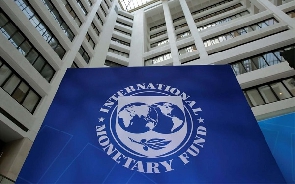For years, the International Monetary Fund has collected billions of dollars in fees from its biggest borrowers, a practice that penalized those most in need. Now, with its coffers refilling and interest rates running high, the world’s lender of last resort is considering giving them a break.
The IMF released a statement last week saying that “a number” of its board members were open to reviewing policies around surcharges, the fees that it charges nations that borrow more than their allotted share or take longer to repay. The rates have climbed above 8 per cent on some loans, with the burden carried by a handful of countries including Argentina, Egypt and Ukraine topping $6 billion.
Brazil President Luiz Inacio Lula da Silva, as host of the Group of 20 this year, promised to make it a top issue amid his calls to reform the international financial system. Representative Chuy Garcia, an Illinois Democrat, plans to reintroduce legislation from 2022 directing the Treasury Department to support a review and end of surcharges, his office said Tuesday.
The IMF describes the fees as a necessary part of its financial model, meant to discourage borrowing too much or taking too long to repay. Borrowers and their supporters say they drain resources needed for essentials such as food and healthcare, and are increasingly punitive given faster inflation and higher interest rates.
The board plans another meeting on the topic in June, according to people familiar with the process who asked not to be identified discussing internal deliberations. It’s still not clear how many board members support the idea of cutting the fees.
“In this perfect storm situation, it’s particularly egregious to be facing these surcharges,” said Michael Galant of the Center for Economic and Policy Research, a progressive think tank that supports surcharge relief. He said the extra charges make loans from other sources, including China, more attractive and risk diluting the fund’s influence.
The fees have been around for years, but higher global interest rates, particularly from the Federal Reserve and European Central Bank, mean that the total rate on some loans from the IMF is now more than 8 per cent. That’s double the level before the Covid-19 pandemic.
As well, the number of countries paying the fees has risen. Twenty-two nations are currently pay surcharges, up from eight in 2019 as the economic and political risks of the post-pandemic world have pushed the IMF’s lending to a near-record $150 billion to almost 100 countries. Fund data compiled by CEPR indicate that 40 per cent of nations that need to repay the fund in the next five years are paying the fees.
The IMF board’s discussion of surcharges came as part of a review of its precautionary balances, the money the fund keeps in store to protect against possible losses. The IMF is on track to hit its target of $33 billion (25 billion SDR) in precautionary balances by the end of this month, ahead of schedule.
The fund’s executive board will start looking into the surcharge issue this summer, which “may present options for possible changes” and will take into account the implications for borrowers and the fund’s risk management, the IMF said in a response to questions. A change to the policy would require 70 per cent of the board’s voting power to approve.
In the fund’s 2022 discussions on precautionary balances, a number of directors didn’t see merit in exploring changes to the policy, noting that the average cost of borrowing for the IMF at that time was well below market rates.
The US, the IMF’s biggest shareholder, has signaled a willingness to reconsider the issue. Treasury Under Secretary for International Affairs Jay Shambaugh said in a speech in September that the Biden administration was open to new approaches that help countries while protecting the IMF’s balance sheet and incentivizing repayment.
“The countries most in need of resources for development usually are those most penalized,” Mauricio Carvalho Lyrio, the Brazilian ambassador managing the G-20 agenda this year, said in an interview last month. He added that the IMF should set up a framework that’s “conducive for poor countries to have access to better and bigger resources.”
Business News of Wednesday, 10 April 2024
Source: bloomberg.com
IMF under pressure to cut billions of dollars in fees for large borrowers
Entertainment












